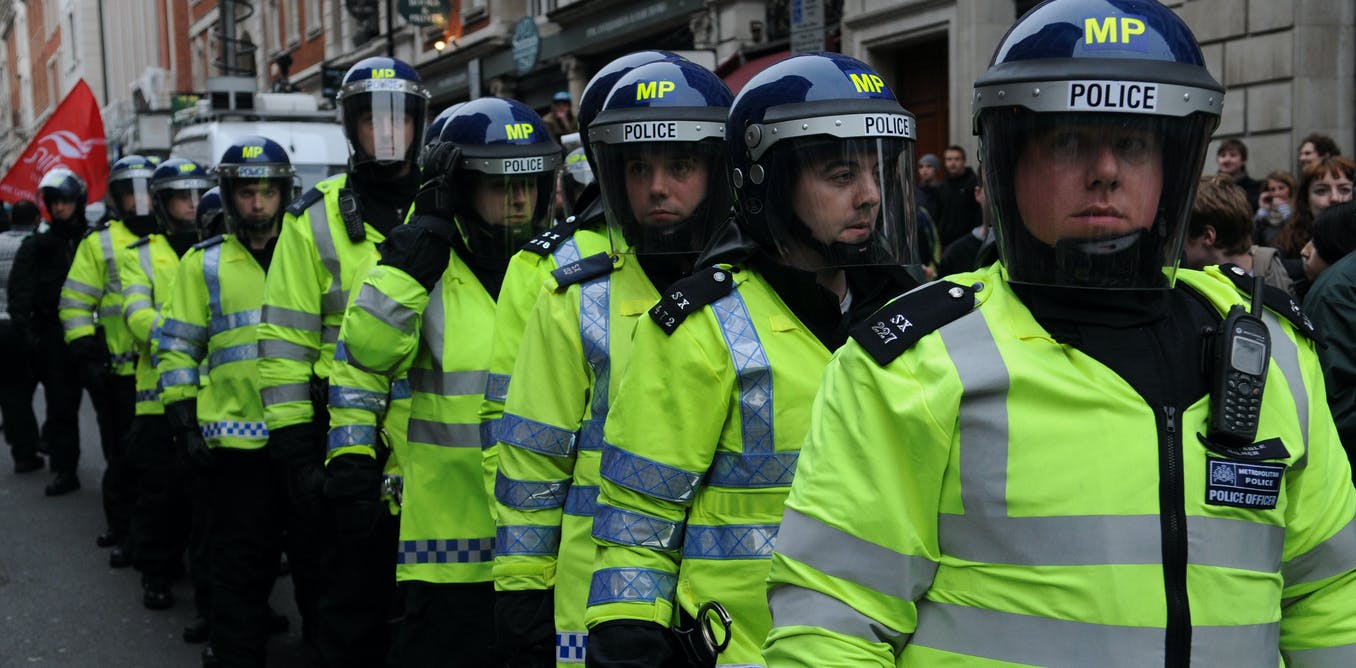Police force diversity is improving in the UK – but there’s a long way to go

Shutterstock/1000words
The death of George Floyd at the knees of officers from the Minneapolis police department and the anger that has cascaded from it, reminds us of how important legitimate, representative and proportionate policing is for democracies. The death of Mark Duggan in the UK nearly ten years ago also sparked nationwide protests which turned into the largest riots the country had experienced in a generation.
In such emotionally charged times – when relations between the police and the African-American community are at a nadir – there is a temptation to conflate the judgement of some American police officers with their UK counterparts. This risks exacerbating existing tensions between black communities and the police here. But the police force in the UK is very different.
In the US, police routinely shoot and kill over 1,000 Americans every year. African-Americans make up less than 14% of the population yet account for more than 23% of deaths. In the UK, the highest number of annual fatal shootings by police was six in 2016-17. For two years – in 2012-13 and 2013-14 – the figure was zero.
Under-representation
Perhaps more troubling than the differences are the similarities when it comes to under-representation of black people in their ranks. This has been a longstanding issue in the US and the UK does not fare much better. As of March 2019 just 7% of UK officers, or (8,329), identified as black and minority ethnic (BAME) – and that was the highest proportion since records began. Black officers in the UK make up only 1.2% of this figure (1,492 officers) – despite black people making up 3.3% of the population.
Representation alone cannot fix larger societal issues when it comes to racism. But when deployed appropriately, it can provide reassurance and support to communities of colour. As the UK’s only ever black chief constable, Michael Fuller outlined in his 2019 memoir, Kill the Black One First, that tensions between black communities and the police are longstanding. In his role as chief constable of Kent and as a senior officer with London’s Metropolitan Police Service, he was able to be an effective conduit between them.
The US has seen a recent surge in police numbers, and many states are now facing bankruptcy due to the impact of COVID-19. This means that the potential for change is limited. The UK is in a much better place here. In 2019, Prime Minister Boris Johnson announced the intention to recruit 20,000 new officers.
Read more:
George Floyd: why the sight of these brave, exhausted protesters gives me hope
The ultimate aim of the UK’s new Police Education Qualifications Framework for training police officers and staff is for the force to be representative of the general population. All new recruits will have three opportunities to enter the service: by attaining a general degree, a pre-joining policing degree or an apprenticeship. There are also “direct entry” routes into roles like detective and senior positions such as inspector and superintendent.
These aspirations ought to be good news for black people who want a career in the police as on average (in 2016), 8% of first-year undergraduates across the UK were black. The trend is even higher in London, which has the highest proportion of black students, making up 17% overall.
No high-ranking black officers
Yet while the UK force is diversifying at its junior levels, at a senior level there are still huge obstacles. For example, in the London Met – the largest force in the UK – there are no black officers at the highest ranks.
One of the Met’s most senior black female officers, Superintendent Robyn Williams, is currently on the sexual offender register after she was found guilty of possessing an indecent image which had been sent to her phone. The decision to prosecute her was labelled a “classic case of institutional racism” by the Black Police Association.
Meanwhile, the latest Home Office figures from 2019 show there is only one black chief officer in the whole country. The Met’s head of human resources, Clare Davis, has said “it would take over 100 years to be more representative of London” if the force continues at its current rate.
The events in the US show how quickly African-American communities can lose trust and faith in the ones who are supposed to “protect and serve”. UK police forces need to grasp this and speed up the scale at which they are recruiting black applicants. So far, anecdotal evidence in our university’s own police training scheme seems to show that the new framework is working, as more diverse applicants are coming through.
Ultimately, if black applicants progress to leadership positions, they might just make a difference. That is because leadership matters. Both President Obama and President Trump witnessed fatal police brutality during their tenure but only one tweeted “when the looting starts, the shooting starts” and experienced the severe consequences which followed.

Dominique Walker is affiliated with The Anthony Walker Foundation and The Goddess Projects.
Daniel Silverstone does not work for, consult, own shares in or receive funding from any company or organisation that would benefit from this article, and has disclosed no relevant affiliations beyond their academic appointment.







